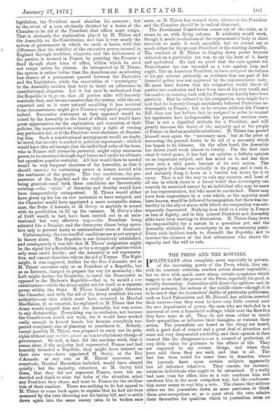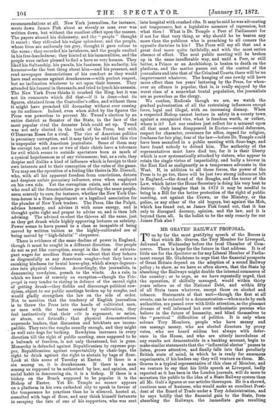THE PRESS AND THE ROWDIES.
POLITICIANS often complain, more especially in private, of the increasing power of the Press, which, they say, with its constant criticism, renders action almost impossible ; but we view with much more alarm certain symptoms which suggest to us that the power of the Press, especially for good, is steadily decreasing. Journalists still direct the opinions and, in a great measure, the actions of the middle-class—though it is to be noted that the journalists' dislike of particular politicians, such as Lord Palmerston and Mr. Disraeli, has seldom arrested their careers—but they seem to have very little control over the new depositaries of power, the men who are included in a universal or even a household suffrage, while over the Rowdies they have none at all. They do not seem either to touch their sympathies, or influence their thoughts, or restrain their action. The journalists are heard as the clergy are heard, with a good deal of respect and a great deal of attention and some not very deep-seated cordiality, and their opinion is then treated like the clergyman's,—as a counsel of perfection, of very little value for guidance in the affairs of life. They are expected to say certain things, and when they have said them they are said, and that is all. The fact has been noted for some time in America, where the journals have upon certain subjects apparently
lost all influence whatever. They cannot, for instance, ostracize individuals who ought to be ostracized. If a really bad man runs for office, they as a rule condemn him, and condemn him in the most outspoken way, but the condemna- tion never seems to cost him a vote. The classes they address either set the journalists down as mere partizans, or think them over-scrupulous, or, as is most often the case, admire their favourites for qualities which to journalism seem no recommendations at all. New York journalism, for instance, wrote down James Fisk about as sternly as man ever was written down, but without the smallest effect upon the masses. The papers abused his dishonesty, and the " people " thought it smart ; they ridiculed his vulgar splendour, and the people, whose lives are uniformly too grey, thought it gave colour to the scene ; they recorded his lavishness, and the people exulted in his free-handedness; they hinted at his immoralities, and the people were rather pleased to find a hero so very human. They liked his Sultanship, his parade, his fussiness, his audacity, his humour—far the best thing about him—and his presence, and read newspaper denunciations of his conduct as they would have read sermons against drunkenness—with perfect respect, but no inclination whatever to act upon their lessons. They attended his funeral in thousands, and tried to lynch his assassin. The New York Press thinks it crushed the Ring, but it was not its comments which did that—if it is done—but its figures, obtained from the Controller's office, and without them it might have preached till doomsday without ever rousing up its audience. Indeed, even when aided by the figures the Press was powerless to prevent Mr. Tweed's election by an entire district as Senator of the State, in the face of the most popular rival the decanter Irish could set up. Tweed was not only elected in the teeth of the Press, but with O'Donovan Roses for a rival. The vice of American politics is pecuniary corruption, and it may fairly be said that this vice is unpopular with American journalists. Some of them may be corrupt too, and one or two of their chiefs have a tolerance for evil which seems to outside spectators born as much of a cynical hopelessness as of any viciousness; but, as a rule, they despise and dislike a kind of influence which is foreign to their own interests and to their conception of the rules of the game. You may see the operation of a feeling like theirs in Mr. Disraeli, who, with all his apparent freedom from convictions, detests and despises unfair pecuniary influence, even when employed on his own side. Yet the corruption exists, and the electors who read all the denunciations go on electing the same people, seem scarcely to care, for instance, whether the New York Cus- tom-house is a State department or a legalized association for the plunder of New York traders. The Press, like the Pulpit, advises honesty, and advises it with some energy, and is thought quite right and proper to advise so, and is then left advising. The advised re-elect the thieves all the same, just as they get drunk while highly approving lectures on sobriety. Power seems to have passed to a class as incapable of being moved by written tuition as the highly-cultivated are of being moved by " high-falutin' " eloquence.
There is evidence of the same decline of power in England, though it must be sought in a different direction. Our people do not as yet like corruption, except in the form of extrava- gant wages for needless State work—about that they behave as disgracefully as any American roughs—but they have a sneaking kindness for brutal horse-play, which always degener- ates into physical violence. Accordingly, the journalists, in denouncing rowdyism, preach to the winds. As a rule, to
which we know of scarcely an exception—though the Tele-
graph is very tender to rioting in defence of the sacred right of getting drunk—they dislike and discourage political row- dyism, object to see public meetings broken up by roughs, and would gladly strengthen the law on the side of order. Not to mention that the tendency of English journalism is to throw the Press into the hands of cultivated men, or men with the tastes created by cultivation, they feel instinctively that their role is argument, or satire, or abuse, not fisticuffs ; that physical demonstrations supersede leaders, that discussion and brickbats are incom- patible. They rate the roughs soundly enough, and they might as well rate dogs for barking. Rowdyism increases in every direction till the right of public meeting, once supposed to be a bulwark of freedom, is not only threatened, but is gone. Monarchy is defended against Republicanism by cayenne pep- per, Republicanism against respectability by chair-legs, the right to drink against the right to abstain by bags of flour. Look at this scene of Tuesday at Exeter. If there is a sin among us, it is drunkenness. If there is a man among us supposed to be authorized by law, and opinion, and social habit in denouncing sin, it is a bishop. If there is a bishop on the Bench supposed to be popular it is the Bishop of Exeter. Yet Dr. Temple no sooner appears on a platform in his own cathedral city to speak in favour of the temperance he practises than he is silenced, hooted at, assaulted with bags of flour, and may think himself fortunate in escaping the fate of one of his supporters, who was sent into hospital with crushed ribs. It maybe said he was advocating not temperance, but a legislative measure of repression, but what then ? What is Dr. Temple a Peer of Parliament for if not for that very thing, or wily should he be beaten any more than the publican who is preaching to all corners the opposite doctrine to his ? The Press will say all that and a great deal more quite faithfully, and with the most entire absence of effect. The next public meeting will be broken up in the same insufferable way, and until a Peer, or still better, a Prince or an Archbishop, is beaten to death on the platform, and the matter passes out of the control of the journalists and into that of the Criminal Courts, there will be no improvement whatever. The hanging of one rowdy will have more effect than ten years' lecturing by the Press, for when- ever an offence is popular, that is, is really enjoyed by the worst class of a somewhat brutal population, the journalists are as powerless as the clergy.
We confess, Radicals though we are, we watch the gradual pulverization of all the restraining influences except force, legal and illegal, with an increasing dismay. When a respected Bishop cannot lecture in safety in a county town_ against a recognized vice, what is freedom worth, or rather, where is it? Let our readers just reflect for a moment upon all that must have disappeared in Exeter—social deference, respect for character, reverence for office, regard for religion, fondness for fair play, fear of the law—before Dr. Temple could have been assaulted in a public meeting with flour-bags, and have found nobody to defend him. The authority of the representatives must have died too, for it is their liberty which is now systematically attacked by rioters, who appear to retain the single virtue of impartiality, and bully a brewer in the East End as malignantly as a temperance advocate in the West. If, in addition to all these forces, the power of the Press is to go too, there will be just two strong influences left in England,—the dread of the Roughs, and the terror of the Law, which latter the Home Secretary is doing his very best to destroy. Only imagine that in 1872 it may be needful to bring in a Bill for the better protection of the right of public meeting, not against the Crown, or the Ministry, or the police, or any other of the old bogeys, but against the Mob, which has found out, as James Fisk found out, that it has only to disregard decency, opinion, and the law, and it is beyond them all. Is the bullet to be the only remedy for our James Fisk also ?



































 Previous page
Previous page